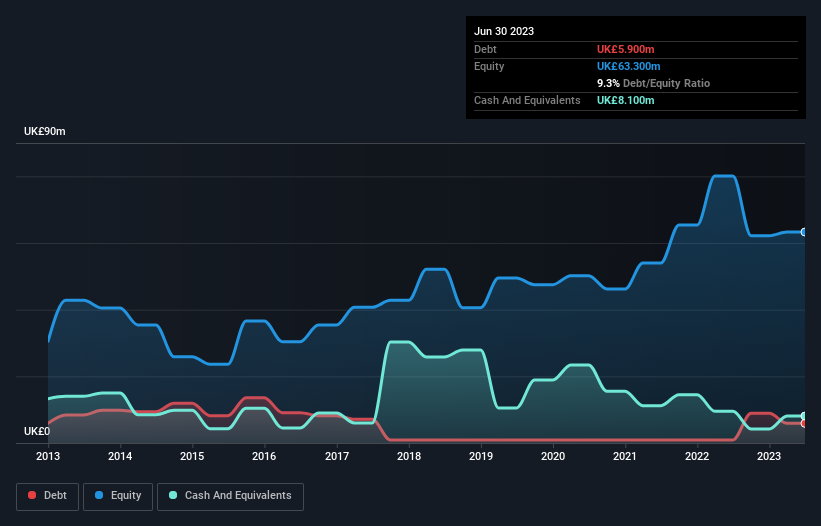Howard Marks put it nicely when he said that, rather than worrying about share price volatility, 'The possibility of permanent loss is the risk I worry about... and every practical investor I know worries about.' When we think about how risky a company is, we always like to look at its use of debt, since debt overload can lead to ruin. We can see that Mpac Group plc (LON:MPAC) does use debt in its business. But the real question is whether this debt is making the company risky.
When Is Debt Dangerous?
Debt assists a business until the business has trouble paying it off, either with new capital or with free cash flow. If things get really bad, the lenders can take control of the business. However, a more common (but still painful) scenario is that it has to raise new equity capital at a low price, thus permanently diluting shareholders. Having said that, the most common situation is where a company manages its debt reasonably well - and to its own advantage. The first thing to do when considering how much debt a business uses is to look at its cash and debt together.
See our latest analysis for Mpac Group
What Is Mpac Group's Net Debt?
You can click the graphic below for the historical numbers, but it shows that as of June 2023 Mpac Group had UK£5.90m of debt, an increase on UK£900.0k, over one year. But it also has UK£8.10m in cash to offset that, meaning it has UK£2.20m net cash.

How Healthy Is Mpac Group's Balance Sheet?
According to the last reported balance sheet, Mpac Group had liabilities of UK£51.2m due within 12 months, and liabilities of UK£18.4m due beyond 12 months. Offsetting this, it had UK£8.10m in cash and UK£44.8m in receivables that were due within 12 months. So its liabilities outweigh the sum of its cash and (near-term) receivables by UK£16.7m.
This deficit isn't so bad because Mpac Group is worth UK£48.3m, and thus could probably raise enough capital to shore up its balance sheet, if the need arose. But it's clear that we should definitely closely examine whether it can manage its debt without dilution. While it does have liabilities worth noting, Mpac Group also has more cash than debt, so we're pretty confident it can manage its debt safely.
Importantly, Mpac Group's EBIT fell a jaw-dropping 40% in the last twelve months. If that earnings trend continues then paying off its debt will be about as easy as herding cats on to a roller coaster. The balance sheet is clearly the area to focus on when you are analysing debt. But ultimately the future profitability of the business will decide if Mpac Group can strengthen its balance sheet over time. So if you're focused on the future you can check out this free report showing analyst profit forecasts.
Finally, a business needs free cash flow to pay off debt; accounting profits just don't cut it. While Mpac Group has net cash on its balance sheet, it's still worth taking a look at its ability to convert earnings before interest and tax (EBIT) to free cash flow, to help us understand how quickly it is building (or eroding) that cash balance. Over the last three years, Mpac Group saw substantial negative free cash flow, in total. While investors are no doubt expecting a reversal of that situation in due course, it clearly does mean its use of debt is more risky.
Summing Up
While Mpac Group does have more liabilities than liquid assets, it also has net cash of UK£2.20m. Despite its cash we think that Mpac Group seems to struggle to grow its EBIT, so we are wary of the stock. When analysing debt levels, the balance sheet is the obvious place to start. But ultimately, every company can contain risks that exist outside of the balance sheet. To that end, you should be aware of the 2 warning signs we've spotted with Mpac Group .
If, after all that, you're more interested in a fast growing company with a rock-solid balance sheet, then check out our list of net cash growth stocks without delay.
New: Manage All Your Stock Portfolios in One Place
We've created the ultimate portfolio companion for stock investors, and it's free.
• Connect an unlimited number of Portfolios and see your total in one currency
• Be alerted to new Warning Signs or Risks via email or mobile
• Track the Fair Value of your stocks
Have feedback on this article? Concerned about the content? Get in touch with us directly. Alternatively, email editorial-team (at) simplywallst.com.
This article by Simply Wall St is general in nature. We provide commentary based on historical data and analyst forecasts only using an unbiased methodology and our articles are not intended to be financial advice. It does not constitute a recommendation to buy or sell any stock, and does not take account of your objectives, or your financial situation. We aim to bring you long-term focused analysis driven by fundamental data. Note that our analysis may not factor in the latest price-sensitive company announcements or qualitative material. Simply Wall St has no position in any stocks mentioned.
About AIM:MPAC
Mpac Group
Provides packaging and automation solutions to healthcare, clean energy, and food and beverage sectors worldwide.
Reasonable growth potential and fair value.
Market Insights
Community Narratives



